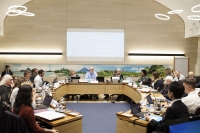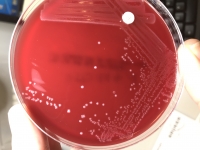News

11/03/2022
In a short video message, FAO Food Safety Officer Vittorio Fattori explains that FAO is seeking scientific experts with solid experience in the assessments of contaminants (including toxins), food additives and veterinary drug residues in foods. FAO is building a roster of experts to conduct assessments as part of the Joint (FAO/WHO) Expert Meeting on Food Additives (JECFA), an international expert scientific committee that gathers periodically on a voluntary basis.
The call for experts was issued on 28 January and will remain open until 28 April 2022.
Watch the video
See more in the call for experts
Read an earlier...

10/03/2022
An update of activities of the FAO/WHO Joint Expert Meeting on Microbiological Risk Assessment (JEMRA), the group that provides scientific advice on the safety assessment of micro-organisms in food, was on the agenda of the 52nd session of the Codex Committee on Food Hygiene (CCFH). Delegates received a briefing on the microbiological risk assessment reports that are expected to be published in 2022:
Listeria monocytogenes
STEC in meat and dairy
Water reuse in fisheries
Water reuse in dairy
Low moisture foods, and
Spices.
In his presentation, Jeffrey LeJeune, FAO Food Safety Officer, also went over publications released in the last two years. For instance,

07/03/2022
On 7 March – with exactly three months to go before the 7 June celebration, the theme for this year’s World Food Safety Day was revealed and the World Food Safety Day guide was published. The theme this year is ‘Safer food, better health’.
World Food Safety Day event organizers around the world are encouraged to focus on the ways in which improvements in food safety can impact on the health of people, animals and the environment. The guide to World Food Safety Day also makes the point that “we need to transform food systems to deliver better health, and we...

07/03/2022
A new FAO publication Thinking about the future of food safety – A foresight report, was released on Monday 7 March, outlining how major global drivers and trends will shape food safety in tomorrow’s world.
All food needs to be safe for human consumption; thus, appropriate food safety measures must form the core of food production in our agrifood systems. As agrifood systems are transformed to meet the 2030 Agenda for Sustainable Development, there is need to develop and maintain a deep understanding of the future opportunities, threats and challenges ahead of us.
What is foresight? Why is it important in food...

03/03/2022
Jorge Pinto Ferreira and Jeffrey LeJeune, FAO Food Safety Officers, are co-authors of a recently published review paper that focuses on the use of antimicrobials in plant agriculture and its associated resistance, from a One Health perspective. The article was published by Agriculture, an international, scientific journal published online by MDPI on a monthly basis.
Antimicrobial resistance (AMR) is associated, at a global level, to close to 5 million human deaths annually. Vegetables contaminated with antimicrobial resistant organisms have caused a number of foodborne disease outbreaks. Understanding the pathways that vegetables become contaminated with antimicrobial resistant organisms can help develop strategies...

02/03/2022
Jorge Pinto Ferreira, FAO Food Safety Officer, spoke about the interconnections between antimicrobial resistance (AMR) and food safety at the “Future Leaders Against AMR” on 25 February. This international programme for students and early career professionals is designed to support their development as future leaders in the work against AMR.
In his presentation, Pinto Ferreira explained the difference between antimicrobial residues and resistance, “By resistance, in simple terms, we mean the capacity of, for example, bacteria to be able to survive after a treatment with an antibiotic that used to be able to kill it,” he said. “While residues are usually...

28/02/2022
A recent FAO publication describes how certain food safety considerations need to be taken into account to ensure acceptable health outcomes in situations where the impact of food insecurity is mitigated through food aid.
Food security exists when people, at all times, have access to sufficient, safe, and nutritious food to meet the dietary needs for a productive and healthy life. Therefore, food safety is closely interlinked with food security.
In times of food insecurity, brought on by conflicts, natural disasters and climate crises, humanitarian relief in the form of food assistance is often distributed by specialized organizations, such as...

09/02/2022
In a Codex podcast, Dr Tim Barkham, Associate Professor at the Tan Tock Seng Hospital in Singapore, delves into how a new strain of Group B Streptococcus (GBS) was discovered and, with drive and determination, found to be linked to raw freshwater fish. The specific strain responsible for an outbreak in Singapore in 2015 was Streptococcus agalactiae sequence type 283 (ST283).
Barkham was one of 24 experts who contributed to FAO work on the risk of this invasive GBS in freshwater fish. Dr Masami Takeuchi, FAO Food Safety Officer who led the work, said that conducting a risk assessment has been impossible because...

08/02/2022
FAO will host a webinar on 17 February 2022 to introduce a new project that will focus on the implementation of Codex standards to support the containment and reduction of foodborne antimicrobial resistance (AMR).
The Codex Alimentarius, or food code, now has three AMR-related texts:
the revised Code of Practice to Minimize and Contain Foodborne Antimicrobial Resistance (CXC 61-2005)
new Guidelines for the Monitoring and Surveillance of Foodborne AMR (CXG 94-2021)
Guidelines for Risk Analysis of Foodborne Antimicrobial Resistance (CXG 77-2011).
The project will facilitate the implementation of these Codex standards in six countries to help build effective national systems to minimize and contain the...

02/02/2022
Food biotechnologies may raise a number of questions whose answers may not always be easy to find. In fact, national food safety competent authorities are often asked by consumers and other stakeholders to provide science-based information in a way that is quick and easy for non-experts to understand, which requires technical knowledge, dissemination outlets, diverse skillsets and time.
Upon Members’ request, FAO has published the “Information toolkit on food biotechnologies with a focus on food safety”, which serves as a basis to assist countries in addressing the general public’s concerns on food biotechnology and food safety, to support them...
Stay up to date and connect to our RSS feed!
